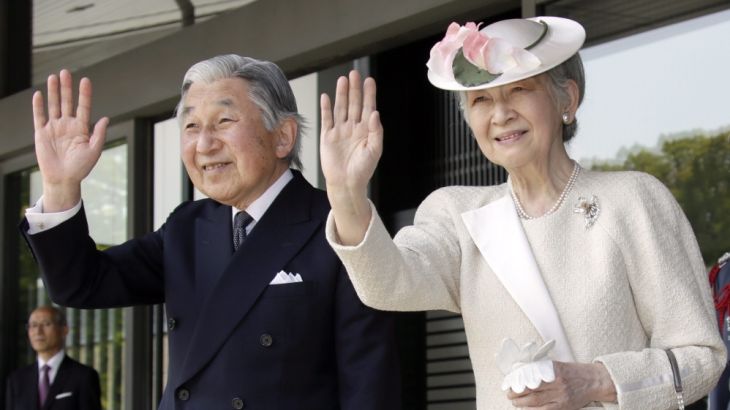Japan: Emperor Akihito worries age may hinder his rule
Emperor Akihito said declining health may hinder ability to fulfill his duties, in sign of possible future abdication.

Japanese Emperor Akihito, 82, said in a rare video address to the public that he worried his age may make it difficult for him to fully carry out his duties.
In nationally televised remarks on Monday, Akihito also said there were limits to reducing the emperor’s duties as the “symbol of the state”, the status accorded to the monarch under Japan’s post-war constitution.
Public broadcaster NHK reported last month that Akihito, who has had heart surgery and been treated for prostate cancer, wanted to step down in a few years – a move that would be unprecedented in modern Japan.
AL JAZEERA’S HARRY FAWCETT IN TOKYO:
We don’t expect the emperor to say in as many words: I express my wish to abdicate. If he were to do that, it would require a change in household law, or some kind of legal provision to be put in place to allow him to do that, and that could be seen in the very strict terms of the constitution as a political intervention by the emperor.
That is something that isn’t allowed to happen here in Japan, so what we’re expecting him to say instead is to signal something along the lines about how he feels about his current position and his ability to carry out his duties.
It wouldn’t be the first time – at the press conference for his 82nd birthday in December, he said that he wished to express his apologies to anyone who felt that he might have made some mistakes during recent public events, that he was feeling his age.
Certainly, there has been a heavy trailing in recent weeks. I think that he does wish to abdicate and this very rare address would potentially allow Japanese bureaucrats to start moving, and make that possible.
They would either have to redraft the imperial household law, which currently has no provision for abdication, or come up with a one-off law pertaining to this particular emperor and this particular moment. He is likely to be on the throne for several years yet while all of that takes place.
I think he will be remembered as someone who very much wanted to promote the idea of peace, and making amends for Japan’s wartime behaviour. Also, he is someone who wanted to reconnect the monarchy with the Japanese people.
Once considered divine, the emperor is defined in the constitution as a symbol of the state and the unity of the people, and has no political power.
Akihito stopped short of saying outright that he wanted to abdicate, which could be interpreted as interfering in politics.
READ MORE: Tokyo elects first female city governor
“When I consider that my fitness level is gradually declining, I am worried that it may become difficult for me to carry out my duties as the symbol of the state with my whole being, as I have done until now,” he said.
Japanese Prime Minister Shinzo Abe said shortly after the pre-recorded address that he would take the emporer’s remarks “seriously”.
Akihito is said to feel strongly that an emperor’s full performance of his duties is integral to his constitutional role, experts say.
Opinion polls show the vast majority of ordinary Japanese sympathise with the emperor’s desire to retire, but this would need legal changes.
The idea has sparked opposition from Prime Minister Shinzo Abe’s conservative base, which worries that debate on the imperial family’s future could widen to the topic of letting women inherit and pass on the throne, anathema to traditionalists.
Speculation about Akihito’s future started last month with reports that he had told confidantes that his advancing age was making it harder to perform ceremonial duties and that he would like to step down in a few years.
Public support
The origins of Japan’s monarchy, said to be the world’s oldest hereditary monarchy, are ancient and legend says that it is an unbroken line going back some 2,600 years.
It is deeply ingrained in the nation’s native Shinto religion and it comes with numerous ritual duties, including planting rice in a field within the palace grounds.
The speech comes during an annual time of sensitivity with August being a month of remembrance. Japan commemorated the US atomic bombing of Hiroshima on Saturday and does so again on Tuesday for Nagasaki.
Counting the cost: Is the sun setting on Japan’s economic slump?
Next Monday, the country will mark the 71st anniversary of its defeat in World War II, an annual event at which the emperor delivers a speech.
Akihito was 11 years old when the war ended and witnessed the destruction it brought to Japan.
He has keenly embraced the role of symbolic sovereign and is credited with making efforts to seek reconciliation both at home and abroad over the legacy of the war fought in his father’s name.
He has visited places that saw some of the most intense fighting, including Okinawa at home and Saipan, Palau and the Philippines abroad, offering prayers for the souls of all the dead, not just Japanese.
Any move by Akihito to step down appears to have wide public support. A survey by Kyodo News last week showed that 85.7 percent of people surveyed were in favour of legal changes that would allow abdication.